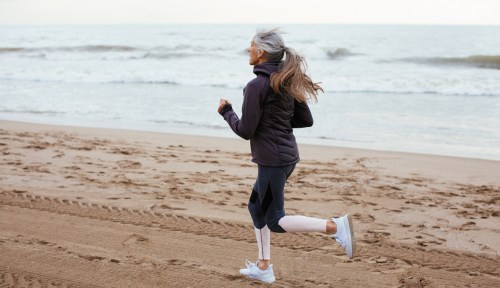Our editors independently select these products. Making a purchase through our links may earn Well+Good a commission
We Need To Talk About ‘Runner’s Face’
Learn about "runner's face" and exercising for pleasure versus worrying about the way something makes you look.

Running benefits your heart, brain, bones, sleep, longevity, and so much more. But recently, a doctor decided to warn against the activity for what it supposedly does to the way you look.
Experts in This Article
More than 3.2 million people have watched a video on TikTok of plastic surgeon Gerald Imber, MD, speaking about the toll running takes on your body, and in particular on the appearance of your face. In a video titled “What exercise makes you age faster?” Dr. Imber describes running as his “pet peeve.”
“Have you ever seen a long-distance, longtime runner that didn’t have a gaunt, old face?” Dr. Imber asks.
Dr. Imber is talking about a phenomenon known as “runner’s face,” which is the idea that running long distances can make you look a certain way, characterized by hollow cheeks and skin with lower elasticity.
“Runner’s face refers to accelerated aging in very athletic people,” says Shasa Hu, MD, a dermatologist and skin cancer specialist on the Dr. BRANDT skincare advisory board.
There may be a correlation between running and a face with these characteristics, but there is also an amount of urban legend associated with “runner’s face.” No evidence exists that the act of running (which includes bouncing up and down) actually causes the skin to sag. Instead, Dr. Hu and fellow Dr. BRANDT advisory board member, dermatologist Evan Rieder, MD, say it comes down to a combination of low body fat and sun damage from spending a lot of time outdoors.
“Because they hold very little fat, their features are very defined,” Dr. Rieder says. “With less volume, the skin can begin to sag, causing the face to appear older than the true biological age. Repetitive and sustained ultraviolet light exposure from the sun also ages the skin through the development of sun spots, precancerous damage, and collagen breakdown. Finally, oxidative damage from the stress of running and exposure to environmental toxins can also contribute to dulling, wrinkling, and sagging of skin.”
So, the effects are real, although they have little to do with the act of running itself. But is this actually something you should be worried about?
In a way, runner’s face is almost the other side of the diet industry coin of exercising to achieve a weight goal. It’s rooted in a relationship with exercise that sees movement as a way to control your appearance, and not something you do for your health or even just for the love of it.
“I’m so tired of hearing about anti-aging like can I just live?” says one of the top comments on the Dr. Imber video.
Well+Good’s senior fitness editor Jennifer Heimlich is a longtime runner and marathoner. She finds the concern over aesthetics antithetical to the act of running—something that makes her feel joy and accomplishment, and which she absolutely does not do to look a certain way.
“What my face looks like is the last thing on my mind when I want to go for a run,” Heimlich says.
There are, of course, common sense things you can do if you want to prevent skin cancer or the physical effects of sun exposure. Namely: Use moisturizer and sunscreen. (Dr. Hu recommends Dr. BRANDT’s iD-STRESS Icy Gel Moisturizer, which Dr. Rieder suggests layering with Dr. BRANDT’s Liquid Sun Shield sunscreen as well as ISDIN Eryfotona Actinica). You might also want to reapply sunscreen on long runs, so make sure to check how long your sunscreen is rated for, and bring a tube along on your trek.
“Just starting with choosing a better time of the day to run and reapplying sunscreen can help significantly,” Dr. Hu says.
But beyond wearing SPF and a hat, how something makes you look should not stop you from doing something you enjoy. And if you’re anything like Heimlich, it won’t.
“Honestly, I do think that being outside in the sun running has aged my face more than if I weren’t a runner, and, at least at this point in my late 30s, I’m totally okay with that,” Heimlich says. “It’s just one more way that running has affected my body, for ‘good’ or ‘bad,’ and in a way, it’s a badge of honor of all the miles I’ve racked up and enjoyed.”
Sign Up for Our Daily Newsletter
Get all the latest in wellness, trends, food, fitness, beauty, and more delivered right to your inbox.
Got it, you've been added to our email list.










